- Home
- Steven Brust
The Book of Athyra Page 9
The Book of Athyra Read online
Page 9
They finished the row and began on the next, and so the morning passed. When it was nearly noon, their rhythm was broken by Pae, who whistled through his fingers to signal that Savn and Polyi were finished for the day.
As they walked back to the house, Polyi said, “Do you think they’ll finish without us?”
Savn looked back at what remained to be done and said, “I hope it doesn’t rain tomorrow.”
Polyi nodded. “Me, too. Shall we go to Tem’s house today?”
“Sure.”
“You didn’t wait for me yesterday, you know.”
“I didn’t? That’s right, I didn’t. I guess I was thinking about other things.”
“Such as what?”
“I don’t know. Things. Anyway, today we’ll go there.”
Savn bathed, and as he’d promised, waited for his sister, and the two of them set off for Tem’s house. They spoke little as they walked, although it seemed to Savn that a couple of times Polyi started to say or ask something, then thought better of it. Eventually she started singing “Dung-Foot Peasant,” and, after a verse or two, Savn joined in, changing pronouns as appropriate. He hadn’t heard it in some time, and laughed at a few of the verses that had been added since he was his sister’s age. He also sang her a few verses that had apparently been forgotten, and he was pleased that she liked them.
When they reached Tem’s house, Vlad was not in evidence, but there was the usual noon crowd, and Savn noticed that he was receiving some odd looks from many of them. Polyi noticed it, too.
“Do you see that?” she said. “The way they look at you? They’re wondering why you’ve been spending so much time with that Easterner.”
Savn quickly looked around, but no one was looking at him just at the moment. “Are they really?” he said.
“Yes.”
“Hmmm.” He shrugged. “Let them wonder, then.”
“Well, what are you doing?”
“I’m learning things.”
“Like what?”
“Like, um, like how to catch gems in the wind—no, I mean, catch water in, uh—oh, never mind. I’m learning stuff.”
Polyi frowned, but couldn’t seem to think of anything to say, which was perfectly all right with Savn. He quickly finished his salad, said goodbye to his sister, and headed off to Master Wag.
On the way, it occurred to him that the sharpness of sensation that he’d felt the evening before was gone. He wondered if it was something that would return as he became more adept in this strange art he had begun to study.
The Master was in better spirits today, puttering around his small house (which had seemed much larger a year before, when Savn had begun studying with him) scattering bits of history with explanations of both the general and the particular. Savn wondered if he had solved the problem of Reins’s death, but decided that, if so, the Master would speak of it in his own time, and if not, he had best not bring the subject up.
And in fact, Master Wag made no mention of it during the entire day, most of which Savn spent cleaning up the Master’s house and listening to the Master’s stories and lectures—a pastime Savn rather enjoyed, even though once Master Wag began to speak he soon lost track of his audience and went far beyond Savn’s knowledge and understanding.
He’s quite a bit like Vlad, he thought, then wondered why the notion disturbed him.
Toward the end of the day, the Master had him recite the questions, conclusions, and appropriate cures for various sorts of stomach ailments, and seemed quite pleased with Savn’s answers, although, actually, Savn left out stabbing pains in the side, and the questions that would lead to a dose of pomegranate seeds to ease an attack of kidney stones.
Master Wag was standing in front of Savn, who was seated on the stool with his back to the hearth; there was a low fire which was just on the edge of being too warm. As the Master finished his explanation, he said, “So, what have you been thinking about, Savn?”
“Master?”
“You’ve had something on your mind all day. What is it?”
Savn frowned. He hadn’t, in point of fact, realized that he had been thinking about something. “I don’t know,” he said.
“Is it our friend Reins?” the Master prompted.
“Maybe.”
“Well, it’s nothing for you to worry about, in any case. I still don’t know what he died of, but I haven’t quit looking, either.”
Savn didn’t say anything.
Master Wag stared at him with his intense gaze, as if he were looking around inside of Savn’s skull. “What is it?” he said.
“How do you know what to believe?” said Savn, who was surprised to bear himself ask the question.
Master Wag sat down opposite Savn and leaned back. “That is quite a question,” he said. “Care to tell me what it springs from?”
Savn found that, on the one hand, he couldn’t dissemble when the Master was staring at him so, but on the other hand, he wasn’t certain of the answer. At last he said, “I’ve been wondering. Some people say one thing, others say another—”
“Who’s been saying what, about what?”
“Well, my friends think that the Easterner had something to do with Reins’s death, and he says—”
“Rubbish,” said Master Wag, but in a tone that was not unkind. “Your friends know nothing, and the Easterner is not to be believed.
“On the other hand,” Wag continued, “that doesn’t answer your question. The way to tell what is true is simply to keep your eyes and ears open, and to use your head. That’s all there is to it.”
Savn nodded, although he felt as if his question hadn’t really been answered. But then, was Master Wag really the person to answer the question at all? He knew about helping people who were ill, but what need did he have to wonder about what truth was? He could ask Bless, but Bless would only tell him to trust the gods, and Speaker would tell him to trust what Speaker himself said.
But then, he wondered, what need did he, Savn, have to think about any of this, either? To this there was no answer, but it didn’t help. He discovered that he wanted very badly to talk to Vlad again, although he wondered if trusting the Easterner too much would be a mistake.
He said, “Thank you, Master. Is there anything else?”
“No, no. Run on home now. And don’t worry so much.”
“I won’t, Master.”
He stepped out into the warm autumn afternoon and immediately began running back toward town, wishing he could teleport. That would be best, he thought. All this time I spend getting from place to place, I could just be there. He wondered if he could convince Vlad to show him how that was done. Probably not, he decided. Most likely it was too difficult, in any case.
Soon enough he was there, and, almost to his surprise, he found Vlad right away, sitting in Tem’s house drinking wine and watching the door, as if he was waiting for Savn, and the smile he gave seemed to confirm this. There were three or four familiar faces as well, but no one Savn felt the need to speak to.
He sat down with the Easterner and gave him a good day, which Vlad returned, and offered to buy him a glass of ale. Savn accepted. Vlad signaled Tem, and Savn couldn’t help but notice the glance the Housemaster gave him as he set the ale down. He wondered if he should be annoyed, and concluded that he didn’t really care.
When Tem had returned to his place behind the counter, Savn said, “I’ve been thinking about our lesson all day. Can you show me some more?”
“Certainly,” said Vlad. “But are you sure you want to be seen with me so much?”
“Why not?”
“Didn’t you notice the looks you’ve been getting?”
“I guess I have,” said Savn. “I noticed it earlier today, too, when I was here with my sister. But why?”
“Because you’re with me.”
“Why do they care about that?”
“Either because I’m an Easterner or because they still think I had something to do with the death of Reins.”
/> “Oh. But you didn’t, did you?”
“I’ve been wondering about that,” said Vlad.
Savn stared at him. “What do you mean?”
“Well, I didn’t kill him,” said Vlad. “But that doesn’t mean I had nothing to do with his death.”
“I don’t understand.”
“As I said before, I doubt it’s coincidence.”
“I wish,” said Savn slowly, “Master Wag could have learned what killed him.”
“Your Master has failed?”
Savn considered the Master’s words about not having given up, and he said, “Yes. He doesn’t know.”
“Then I do.”
Savn felt his eyes growing wide. “What?”
“I know what killed him.”
“How could you?”
“Because Master Wag failed. That is all the information I need.”
“But, well, what was it?”
“Sorcery.”
Savn shook his head. “Master Wag said that sorcery leaves traces.”
“Certainly, if used in a simple, straightforward way, such as causing the heart to stop, or inducing a hemorrhage, or in a way that leaves a visible wound.”
“But, then, what happened to him?”
“Do you know what necromancy is?”
“Well, not exactly.”
“Necromancy, in its most basic form, is simply the magic of death—those particular forces that are released when a living thing passes from existence. There are those who study ways to cheat death, ways to extend or simulate life, attempting to erase the difference between life and death. And some study the soul, that which exists after the death of the body, and where it goes, which leads to the study of other worlds, of places that cannot normally be reached and those beings who live there, such as gods and demons, and the forces that operate between worlds, places where life meets unlife, where reality is whim, and Truth dances to the drum of desire, where—”
“I don’t understand.”
“Oh, sorry. I was rambling. The point is, a skilled necromancer would be able to simply send a soul into limbo, without doing anything that would actually kill the person.”
“And the person would just die?”
“Usually.”
“Usually? What happens the rest of the time?”
“I don’t want to talk about it. It doesn’t matter in this case, anyway. A necromancer could achieve the effect you saw in Reins.”
“What about the horse?”
“What about it?”
“Well, it bolted, as if it were afraid of something.”
“That doesn’t surprise me. Animals are often very sensitive to magic. Especially the dumber beasts.” There was something odd in the way he said that, as if he were sharing a joke with himself.
Savn thought all of this over, and said, “But who—?”
“Loraan, of course. I mean, Baron Smallcliff. He is a necromancer. Moreover, he is undead himself, which proves that he is a skilled necromancer, if I hadn’t known it before.”
“Undead? You want me to believe His Lordship is a vampire?”
“A vampire? Hmmm. Maybe. Do you know of any cases of mysterious death, blood drained, all that?”
“No. If something like that happened around here, I’d have heard of it.”
“So perhaps he is not a vampire. Although that proves nothing. Sethra is a vampire, but she still eats and drinks, and requires very little blood.”
“Who?”
“An old friend.”
“I think I’ve heard of her,” said Savn. “Although I can’t remember from where.”
“Doubtless just someone with the same name.”
“I suppose. But do you really know a vampire?”
“An odd one. Never mind. Still, I wonder what he is—”
“What other sorts of undead are there?”
“I’m not an expert on the subject. Perhaps dear Lord Smallcliff will let me use his library to look it up.”
“But then you could just ask him.”
“I wasn’t serious,” said Vlad.
“Oh. I can’t believe His Lordship is undead.”
“Why not?”
“Well, because, uh, I just can’t.”
“I understand,” said Vlad. “All your life there are people you just assume you can trust, yet you don’t really know them. Then, out of nowhere, someone walks up to you and asks you to believe that one of them is some kind of monster. I wouldn’t believe it either. At least, not without a lot more proof than you’ve seen.”
Savn stared at him, not certain what to say. He seemed to be talking to himself, and, once more, Savn felt the undercurrent of hatred in the Easterner’s voice.
“That’s how they do it, that’s how they get away with everything, because it’s so much easier just to go along with what you’re told than to look at—” He caught himself, as if aware that he had left his listener far behind.
For a moment he seemed to be thinking about trying to explain; then he shrugged. “Believe it or not, as you will. What I want to know is what the son of—uh, what the fellow has planned. The coincidence, as I said, is too great. He can’t just kill me the way he killed Reins, so—”
“Huh? He wants to kill you?”
“He does indeed. But I’m protected rather better than Reins was.”
“Oh. But why would he want to kill you at all?”
“He has reasons.”
Savn thought about this. “So, what is he going to do?” he asked.
“I wish,” said Vlad, “that I had some means of figuring that out. There’s probably no point in running once things have gone this far. Besides, I owe him, for Reins.”
“You owe him? You said something about that before. What do you mean?”
Vlad shrugged. “I was mostly talking to myself. But I just wish I knew what he was planning.”
“Can’t witchcraft tell you?”
“It’s not very useful for seeing the future.”
“That’s too bad.”
“Maybe.”
“So what are you going to do?”
“Try to find out,” said Vlad. “I have other ways. Sometimes they even work.”
He stared off into the distance, as if he were communing with things unseen.
7
I will not marry a poor musician,
I will not marry a poor musician,
He’d be playing and I’d be wishin’.
Hi-dee hi-dee ho-la!
Step on out . . .
VLAD TOYED WITH HIS salad but ate little, either because he didn’t like the taste or because he was thinking of other things. Savn ate his own salad with, if no great delight, at least considerable appetite.
Savn felt Vlad watching him, which made him slightly nervous as he squeezed an expensive piece of lemon over the cheese and vegetables, put another handful of salad into his mouth, and wiped his hand on his shirt. The Easterner sighed. “I know a place,” he said, “where one could eat every day for half a year and never taste the same dish twice. Where the servers are discreet and efficient; you never noticed them, but there is always a full plate in front of you and wine in your glass. Where the room is quiet and serene and tasteful, calling the diner’s attention to the delight of the tongue. Where the appetizer is fresh, enticing and excites the senses like the first touches of love. Where the fruit is sweet and plump, or tart and crisp, and complements the cheese as the salad complements the bread—with reverence and solemn joy. Where there is a choice of wine to suit the most diverse taste, yet each has been selected with care, and tenderness. Where each meat is treated with the honor it deserves, and is allowed to unfold its own flavor in the natural juices the gods gave it, with touches of savory, ginger, or tarragon added to direct the attention of the palate to the hidden joys which are unique to that particular cut. Do you know what I am saying? A place where the mushroom and the onion dance with the wine and the peppers in sauces that fire the palate, and the sweet at the end of the m
eal is the encore to a symphony of the heart. Where—”
“You don’t much like the food here, do you?” said Savn.
“—there is quiet and ease, with only that conversation that flows like the wine from the bottle, easy and natural, and all else, save the sounds of dining, is the silence that food requires for—”
“There isn’t any music? I thought the best taverns had music.”
Vlad sighed and returned from his reverie. “No, there is no music. I don’t like music when I eat. Although,” he added, “I must admit that, here, music would be a welcome distraction.”
“Well, you are likely to get your wish. There will probably be someone arriving today or tomorrow. There hasn’t been a minstrel in several days, and there are usually one or two a week. Besides, harvest is almost over, and they always show up around the end of harvest.”
“Indeed?” said Vlad, sounding suddenly interested. “A minstrel? Good.”
“Why?”
“I like minstrels,” said Vlad.
“You mean you like to listen to them, or they are the sort of people you like?”
“Both, actually.”
“You’ve known minstrels, then?”
“Several.”
“I didn’t know they had them in the big cities.”
“Just about anything you can find outside the city you can find in it as well.”
“Really?”
“Yes.” Vlad looked thoughtful for a moment, then added, “Although there are exceptions.”
Savn returned to his salad, while waiting for Vlad to continue. When the Easterner did not do so, Savn swallowed and said, “What are the exceptions?”
“What? Oh. Peace and quiet, for example,” said Vlad. “You don’t know how pleasant these things are unless you’ve gone most of your life without them. Do you know, when I left the city I had trouble sleeping for quite a while, just because I wasn’t used to the silence.”

 Phoenix
Phoenix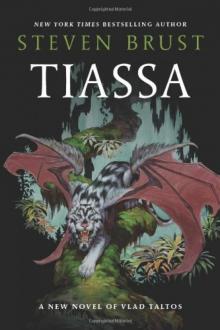 Tiassa
Tiassa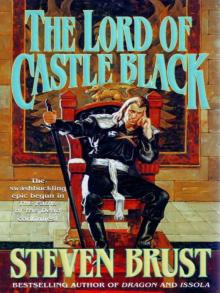 The Lord of Castle Black
The Lord of Castle Black To Reign in Hell: A Novel
To Reign in Hell: A Novel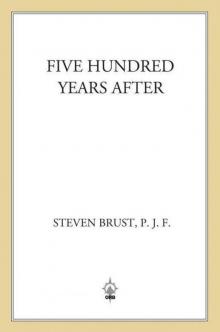 Five Hundred Years After (Phoenix Guards)
Five Hundred Years After (Phoenix Guards)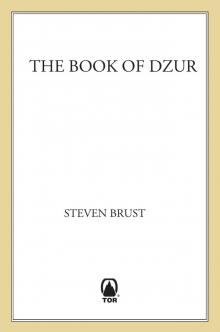 The Book of Dzur: Dzur ; Jhegaala
The Book of Dzur: Dzur ; Jhegaala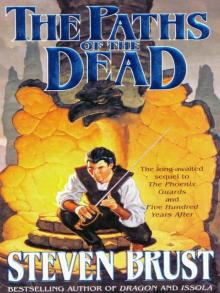 The Paths of the Dead
The Paths of the Dead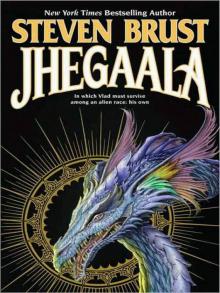 Jhegaala
Jhegaala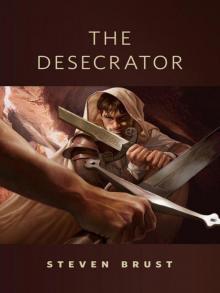 The Desecrator: A Tor.com Original
The Desecrator: A Tor.com Original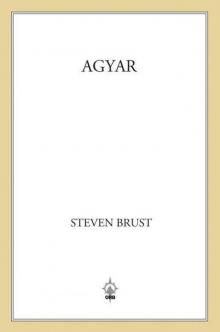 Agyar
Agyar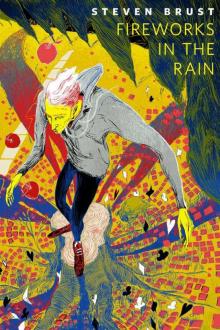 Fireworks in the Rain
Fireworks in the Rain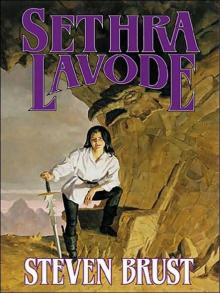 Sethra Lavode
Sethra Lavode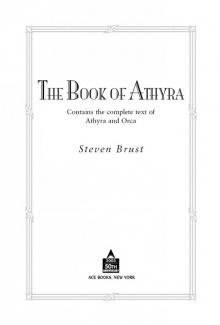 The Book of Athyra
The Book of Athyra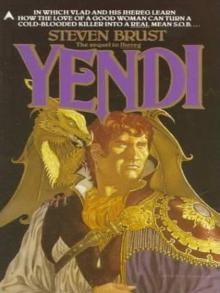 Yendi
Yendi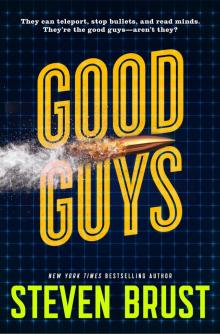 Good Guys
Good Guys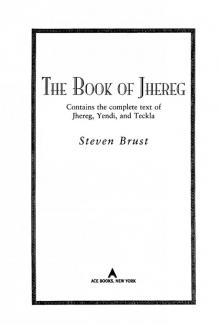 The Book of Jhereg
The Book of Jhereg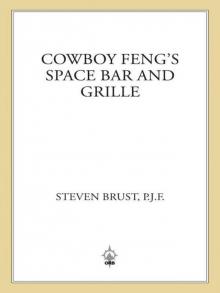 Cowboy Feng's Space Bar and Grille
Cowboy Feng's Space Bar and Grille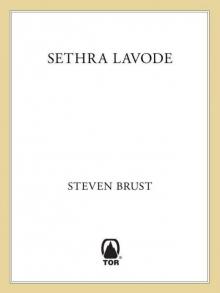 Sethra Lavode (Viscount of Adrilankha)
Sethra Lavode (Viscount of Adrilankha) My Own Kind of Freedom
My Own Kind of Freedom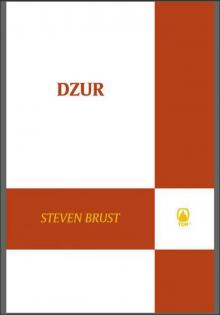 Dzur (Vlad Taltos)
Dzur (Vlad Taltos)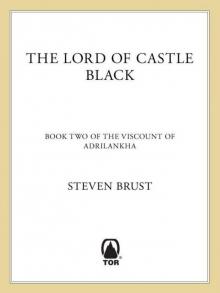 The Lord of Castle Black: Book Two of the Viscount of Adrilankha
The Lord of Castle Black: Book Two of the Viscount of Adrilankha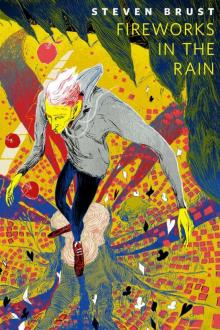 Fireworks in the Rain: A Tor.Com Original
Fireworks in the Rain: A Tor.Com Original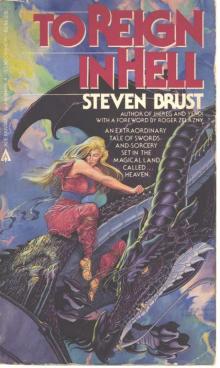 To Reign In Hell
To Reign In Hell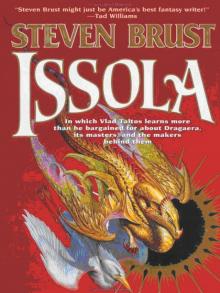 Issola
Issola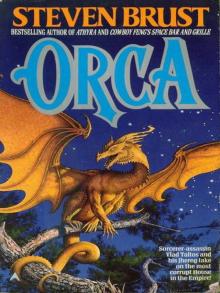 Orca
Orca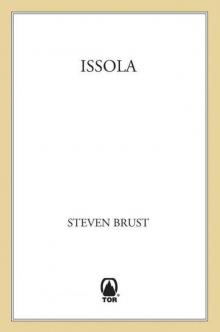 Issola (Vlad Taltos)
Issola (Vlad Taltos)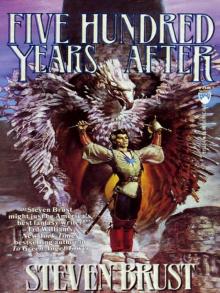 Five Hundred Years After
Five Hundred Years After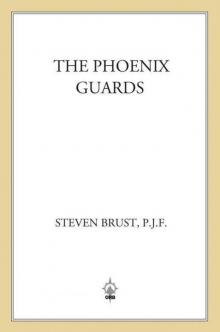 The Phoenix Guards
The Phoenix Guards Taltos
Taltos![[Vlad Taltos 06] Athyra Read online](http://i1.bookreadfree.com/i1/03/24/[vlad_taltos_06]_athyra_preview.jpg) [Vlad Taltos 06] Athyra
[Vlad Taltos 06] Athyra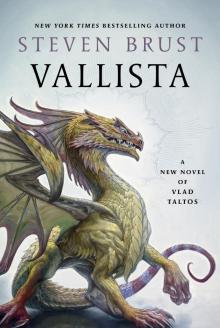 Vallista--A Novel of Vlad Taltos
Vallista--A Novel of Vlad Taltos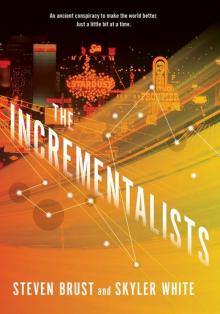 The Incrementalists
The Incrementalists![[Vlad Taltos 04] Taltos Read online](http://i1.bookreadfree.com/i/03/24/[vlad_taltos_04]_taltos_preview.jpg) [Vlad Taltos 04] Taltos
[Vlad Taltos 04] Taltos![[Vlad Taltos 03] Teckla (v 1.1) Read online](http://i1.bookreadfree.com/i1/03/27/[vlad_taltos_03]_teckla_v_1_1_preview.jpg) [Vlad Taltos 03] Teckla (v 1.1)
[Vlad Taltos 03] Teckla (v 1.1)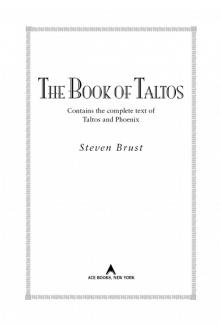 The Book of Taltos
The Book of Taltos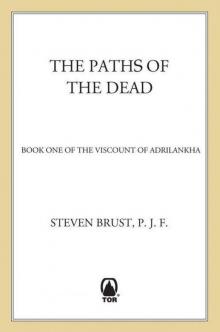 The Paths of the Dead (Viscount of Adrilankha)
The Paths of the Dead (Viscount of Adrilankha)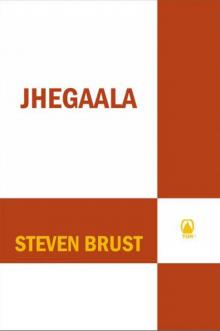 Jhegaala (Vlad Taltos)
Jhegaala (Vlad Taltos)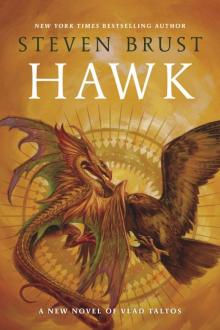 Hawk (Vlad)
Hawk (Vlad)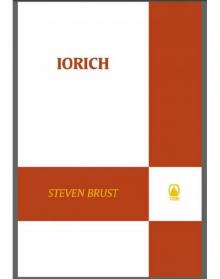 Iorich
Iorich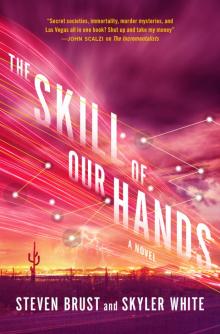 The Skill of Our Hands--A Novel
The Skill of Our Hands--A Novel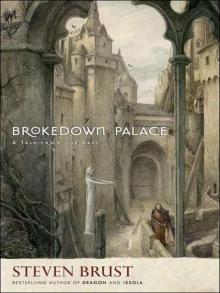 Brokedown Palace
Brokedown Palace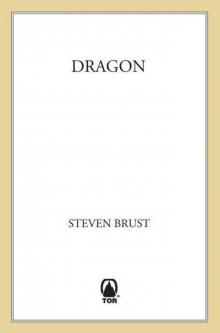 Dragon (Vlad Taltos)
Dragon (Vlad Taltos) Dragon
Dragon Athyra
Athyra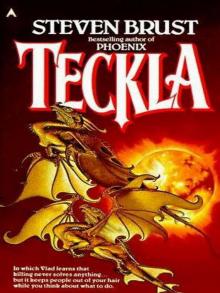 Teckla
Teckla Dzur
Dzur